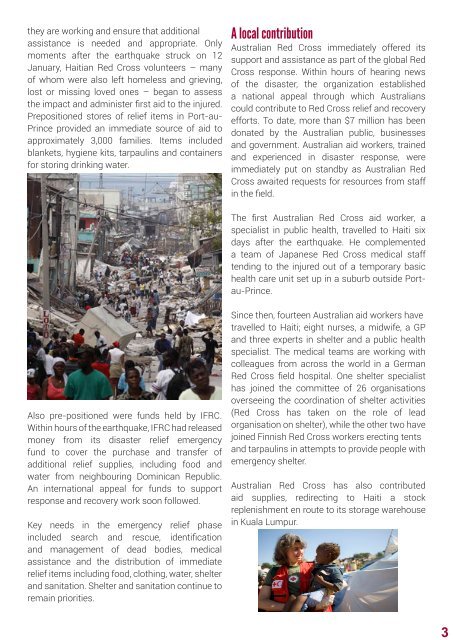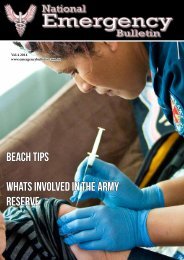Emergency Dispatch Vol 4 2014
You also want an ePaper? Increase the reach of your titles
YUMPU automatically turns print PDFs into web optimized ePapers that Google loves.
3<br />
they are working and ensure that additional<br />
assistance is needed and appropriate. Only<br />
moments after the earthquake struck on 12<br />
January, Haitian Red Cross volunteers – many<br />
of whom were also left homeless and grieving,<br />
lost or missing loved ones – began to assess<br />
the impact and administer first aid to the injured.<br />
Prepositioned stores of relief items in Port-au-<br />
Prince provided an immediate source of aid to<br />
approximately 3,000 families. Items included<br />
blankets, hygiene kits, tarpaulins and containers<br />
for storing drinking water.<br />
A local contribution<br />
Australian Red Cross immediately offered its<br />
support and assistance as part of the global Red<br />
Cross response. Within hours of hearing news<br />
of the disaster, the organization established<br />
a national appeal through which Australians<br />
could contribute to Red Cross relief and recovery<br />
efforts. To date, more than $7 million has been<br />
donated by the Australian public, businesses<br />
and government. Australian aid workers, trained<br />
and experienced in disaster response, were<br />
immediately put on standby as Australian Red<br />
Cross awaited requests for resources from staff<br />
in the field.<br />
The first Australian Red Cross aid worker, a<br />
specialist in public health, travelled to Haiti six<br />
days after the earthquake. He complemented<br />
a team of Japanese Red Cross medical staff<br />
tending to the injured out of a temporary basic<br />
health care unit set up in a suburb outside Portau-Prince.<br />
Also pre-positioned were funds held by IFRC.<br />
Within hours of the earthquake, IFRC had released<br />
money from its disaster relief emergency<br />
fund to cover the purchase and transfer of<br />
additional relief supplies, including food and<br />
water from neighbouring Dominican Republic.<br />
An international appeal for funds to support<br />
response and recovery work soon followed.<br />
Key needs in the emergency relief phase<br />
included search and rescue, identification<br />
and management of dead bodies, medical<br />
assistance and the distribution of immediate<br />
relief items including food, clothing, water, shelter<br />
and sanitation. Shelter and sanitation continue to<br />
remain priorities.<br />
Since then, fourteen Australian aid workers have<br />
travelled to Haiti; eight nurses, a midwife, a GP<br />
and three experts in shelter and a public health<br />
specialist. The medical teams are working with<br />
colleagues from across the world in a German<br />
Red Cross field hospital. One shelter specialist<br />
has joined the committee of 26 organisations<br />
overseeing the coordination of shelter activities<br />
(Red Cross has taken on the role of lead<br />
organisation on shelter), while the other two have<br />
joined Finnish Red Cross workers erecting tents<br />
and tarpaulins in attempts to provide people with<br />
emergency shelter.<br />
Australian Red Cross has also contributed<br />
aid supplies, redirecting to Haiti a stock<br />
replenishment en route to its storage warehouse<br />
in Kuala Lumpur.





